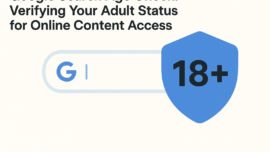In a significant move to enhance online safety, Google has introduced an age verification system, requiring users to validate their adulthood before accessing certain content, a shift reflecting broader regulatory trends around child safety online.
Contents
Short Summary:
- Google’s new age verification policy aims to ensure users are of legal age for accessing online content.
- Users must verify their age or set up parental supervision within a 14-day grace period upon account registration.
- This policy aligns with recent global legislation emphasizing child safety in digital spaces.
Google’s Age Verification Initiative
The implementation of Google’s age verification policy marks a crucial step in the ongoing battle for online safety. This system is designed to confirm that users are of legal age to access various online content, most notably adult material here.
Users creating or managing a Google account must meet the minimum age requirement for their respective country. When Google suspects a user may be underage, it triggers a 14-day grace period during which the user can either verify their age or set up parental supervision. “This is a proactive approach in ensuring that our platforms remain safe spaces for everyone,” said a Google spokesperson.
Verification Process
To verify their age, users can use a government-issued ID or a credit card:
- Government-Issued ID: Users can securely upload a photograph of their ID, which preserves privacy by not making personal information public.
- Credit Card Verification: Although this method assumes that most credit card holders are adults, it still carries risks, such as potential misuse by minors.
“If you attempt to change your birthdate after verification, you may be required to verify again, reinforcing our commitment to maintaining a safe digital environment,” the spokesperson noted.
Failure to comply results in account suspension after 14 days, with potential content loss if the situation remains unresolved beyond 30 days. This level of enforcement has raised concerns among privacy advocates, who argue that requiring personal data could lead to security breaches.
Global Legislative Influences and Implications
This age verification initiative is not an isolated event. A flurry of new legislations is cropping up globally, as jurisdictions grapple with protecting children online. The UK’s Online Safety Act 2023 mandates age verification for all content deemed harmful to minors. Similar laws are being pushed through in states like Louisiana, where age verification for accessing adult content became mandatory on July 1, 2024.
The Louisiana Age Verification Law specifically targets social media and adult content platforms, compelling them to implement reasonable verification measures to guard users under 16 years. This move positions Louisiana at the forefront of safeguarding digital spaces against unregulated adult content access.
According to a press release from Louisiana officials, “This law is essential for the safety of our children in an age where accessing inappropriate content is just a click away.”
Privacy Concerns with Age Verification
While the initiatives aim to improve child safety, they also spark significant privacy concerns. Critics argue that requiring individuals to upload government IDs or credit cards to access websites normalizes the sharing of Personally Identifiable Information (PII).
A privacy advocate from the Electronic Frontier Foundation remarked, “Asking users to submit sensitive personal data can open doors for identity theft and mismanagement of their information. The system, ultimately, could become more intrusive than beneficial.”
The reliance on such systems also raises questions about digital dependency on technology giants like Google, Apple, and others, who would become the custodians of digital identities.
Alternative Solutions and Future Outlook
Some experts advocate for more private methods of age verification. For instance, device-based verification employs an individual’s smartphone operating system to validate age, without transmitting sensitive personal data to websites. This “zero-knowledge” solution could facilitate privacy while safeguarding online interactions.
As one tech analyst stated, “In theory, a zero-knowledge proof approach could check an individual’s age without exposing their identity or browsing preferences to third parties.”
However, concerns over governmental surveillance and data access persist. The slippery slope of expanding age verification to other content types could lead to broader restrictions, impacting freedoms beyond adult content. Recent moves by the Australian government to limit social media access illustrate the tangible consequences of strict age verification policies.
Australia’s proposed legislation suggests banning social media access for users under 16 years, reflecting the growing global consensus that online safety should take precedence, even at the cost of privacy rights.
Conclusion
As Google rolls out its new age verification measures, both supporters and detractors will continue to debate the priorities of child safety versus personal privacy.
The intersection of technology and legislative action is reshaping how we engage with the digital world. For individuals striving to maintain privacy, understanding these evolving requirements is crucial. Platforms like Autoblogging.ai can empower users and content creators by generating SEO optimized articles that explore and challenge these changes in the digital landscape.
Ultimately, being informed and advocating for privacy-conscious solutions will shape the future of our online environments. As the landscape evolves, users need not only be aware of new regulations but also be proactive in understanding how these changes affect their digital lives.
Do you need SEO Optimized AI Articles?
Autoblogging.ai is built by SEOs, for SEOs!
Get 30 article credits!


